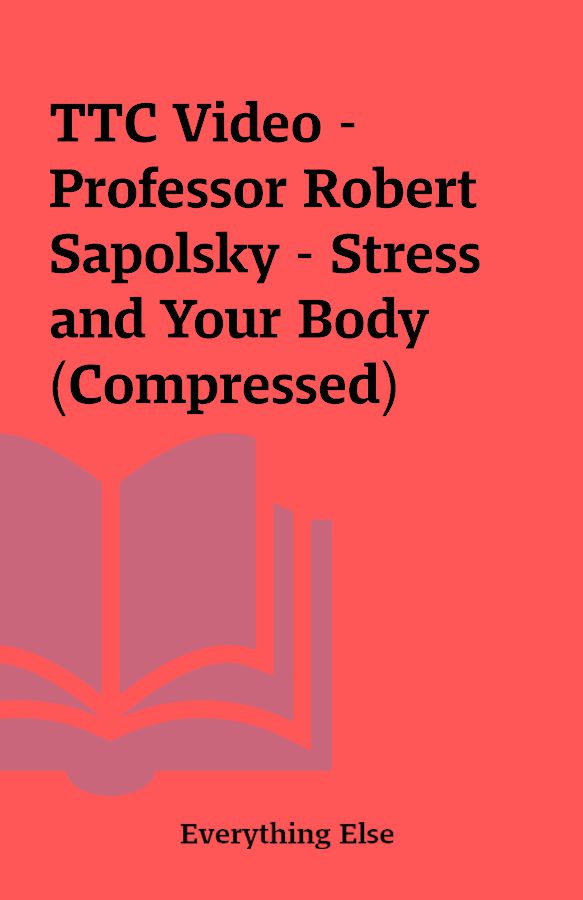TTC Video – Professor Robert Sapolsky – Stress and Your Body (Compressed)
TTC – Stress and Your Body ( Compressed )
[ 24 AVI ]
Description
This is a compressed version of this previous product : No.1585Professor Robert SapolskyStanford UniversityPh.D., Rockefeller UniversityFeeling stressed? You’re not alone. Stress is an inherent aspect of life in the 21st-century world. Regardless of the cause, stress is bound to affect you at some point during your day or week.And stress can have tremendous negative effects on your mental and physical health. Most Western diseases that slowly get us sick—heart disease, diabetes, stroke—are worsened by stress. Chronic illnesses like rheumatoid arthritis and depression often flare up during repeated instances of stress. This makes coping with stress a critical part of how well we live.But take heart. Because once you understand the inner workings of our stress response system and its inextricable links to all aspects of your personal health, you’ll find yourself in possession of powerful knowledge that will help you understand and better deal with this common aspect of your busy life.Now, from one of the world’s foremost researchers on stress and neurobiology comes Stress and Your Body—a fascinating 24-lecture course that guides you through the psychological and psychosocial stress that is a central part of everyday life in Western society. With the guidance of Dr. Robert Sapolsky, acclaimed Professor of Biology, Neurology, and Neurosurgery at Stanford University and one of our most popular professors, you’ll explore the nuts and bolts of the stress-response system and its various effects on your body.What, Exactly, Is Stress?Simply put, the stress-response system is a natural, highly adaptive survival system. Imagine you’re a zebra being chased by a lion across some grassy savannah. Once you’ve recognized the threat, your stress-response system will divert energy from storage sites throughout your body to your muscles and inhibit unessential processes like digestion and reproduction, allowing you to flee faster from danger.For animals, of course, coping with stress isn’t a big deal; once they’ve escaped danger, their bodies and minds soon return to a balanced state. But for humans under chronic stress, there is rarely such a return.Why? Because, for humans, the stress response is triggered not so much by life-or-death situations as by psychological reasons it wasn’t designed to combat, such as * traffic tie-ups that double the time it takes for you to get to work; * complicated home repairs you haven’t gotten around to making; * troublesome thoughts and recurring memories; and * worries about the economy, the environment, and international events.In fact, as you quickly discover in this lecture series, the chronic stress that most of us face every day can turn the stress response from a safety mechanism into a real problem for our physical and mental well-being.At the heart of any serious discussion of the impact of chronic stress on your body and mind lie some pointed questions: * How does everyday stress affect the way your brain behaves? * Why do some people adapt to stress more easily than others? * What occurs at the neurological level during periods of emotional trauma? * Why does stress not just impact your mind (where it’s rooted) but your body as well? * Why does stress prompt you to do certain things, like eat and sleep more (or less)?The science behind these and other questions is captivating in its intricacies.Explore the Biology of Stress …With the same dynamic teaching skills that won him the Walter J. Gores Award for Excellence in Teaching—Stanford’s highest teaching honor—Professor Sapolsky guides you through the specific systems of your body in the search for the biological effects of stress. He first details how the stress response normally works for both humans and the hypothetical hunted zebra, then delves into what happens to these systems when the stress response doesn’t shut down.Among the specific organ systems you explore in Stress and Your Body are these: * Cardiovascular system: When stress hits, your blood pressure and heart rate rise, and blood is diverted from nonessential areas (like your gut) to critical ones (such as your muscles). When activated chronically, however, the stress-response system can damage your heart muscles and blood vessels. * Digestive system: Chronic stress can wreak havoc with your digestive system and can even shut it down. This can lead to debilitating diseases and problems with your digestion. * Reproductive system: Not only is chronic stress directly related to problems with reproduction, it affects the reproductive systems of men and women in different ways. Sustained stress can decrease the likelihood of ovulation and increase erectile dysfunction. For both sexes, however, libido is often greatly impaired. * Immune system: Your immune system is designed to protect you from all sorts of pathogens. Unfortunately, when hit repeatedly with stress, your immune defenses are often impaired, resulting in more frequent, prolonged, or severe cases of diseases ranging from mononucleosis to the common cold.This systems approach helps you better grasp the detailed science and biology behind stress. It also allows you to draw pointed comparisons with stress’s effects on individual systems of the body—sometimes separately, sometimes simultaneously. You’ll quickly discover that stress doesn’t affect just one part of the body, but it also has a domino effect in which your entire body can become damaged by the effects of chronic stress.You’ll also get a chance to explore the physiological effects of stress on other parts of your health, including your * physical growth and development, * sleep cycle, * memory and judgment, and * pain threshold…. and the Psychology of StressBut the biology of stress is only one-half of the puzzle. Stress and Your Body also brings you up close and personal with the psychological underpinnings and effects of stress. There are powerful psychological factors that modulate how we respond to stress and that are instrumental in damaging not just our brains—but our psyches.Among the psychological disorders and damaging behaviors that Professor Sapolsky explores are * depression, the genetics of which are indelibly linked to the genetics of one’s vulnerability to stress; * anxiety, which is rooted in the amygdala—a part of our brain that is extremely sensitive to one class of stress hormones; and * addiction, which can be directly related to increased levels of stress hormones in the body, whether it’s an addiction to drugs or to new sensations.Additionally, an individual’s place in society plays a key role in both the creation and impact of stress. Toward the end of the course, you’ll spend some time studying the relationship between low socioeconomic status and high stress levels—along with the poor health to which they lead.Discover the Key to ChangeWith Stress and Your Body, you’ll be learning about this integral—for better or worse—aspect of daily life from an engaging and insightful teacher. Professor Sapolsky knows just how important it is to understand the workings of stress, but he also flavors his lectures with humor and practical tips for stress management that you can incorporate into your lifestyle.Professor Sapolsky’s unique teaching methods, in which profound insights, eye-opening concepts, and rigorous scientific support are intertwined with an informal delivery style, make the study of this topic absolutely illuminating.”It’s possible for us to change,” he notes with characteristic enthusiasm at one point in Stress and Your Body. “It’s hard in terms of there being no free lunch. But nonetheless, change can occur.”And the key to changing the impact of stress in your life, whether at work or at home, is a thorough knowledge of how and why it works on your mind and body. All of which you’ll find right here in these dynamic lectures.24 Lectures30 minutes / lecture1. Why Don’t Zebras Get Ulcers? Why Do We? (info)2. The Nuts and Bolts of the Stress-Response3. Stress and Your Heart4. Stress, metabolism, and Liquidating Your Assets5. Stress, Overeating, and Your Digestive Tract6. Stress and Growth Echoes from the Womb7. Stress, Growth, and Child Development8. Stress and Female Reproduction9. Stress and Male Reproduction10. Stress and Your Immune System11. Stress and Cancer12. Stress and Pain13. Stress, Learning, and Memory14. Stress, Judgment, and Impulse Control15. Stress, Sleep, and Lack of Sleep16. Stress and Aging17. Understanding Psychological Stress18. Psychological Modulators of Stress19. Stress and the Biology of Depression20. Stress and the Psychology of Depression21. Anxiety, Hostility, Repression, and Reward22. Stress, Health, and Low Social Status23. Stress Management Clues to Success?24. Stress Management Approaches and CautionsAbout Your ProfessorDr. Robert Sapolsky holds the John A. and Cynthia Fry Gunn Professorship of Biological Sciences at Stanford University, where he is also Professor of Biology, Neurology, and Neurosurgery in Stanford’s School of Medicine. He is also a research associate at the Institute of Primate Research, operated by the National Museums of Kenya in Nairobi.The recipient of a MacArthur “genius” fellowship, Professor Sapolsky has won numerous awards for his dynamic teaching skills, including the 2009 Walter J. Gores Award for Excellence in Teaching—Stanford University’s highest teaching honor.
You must be logged in to post a review.






Reviews
There are no reviews yet.